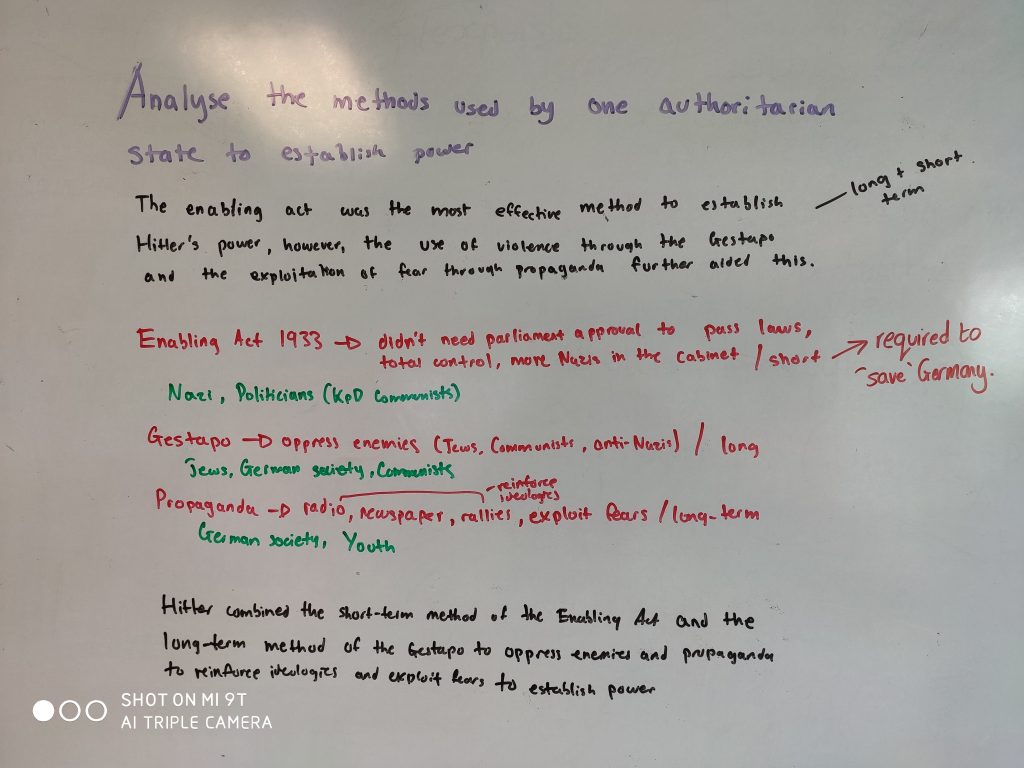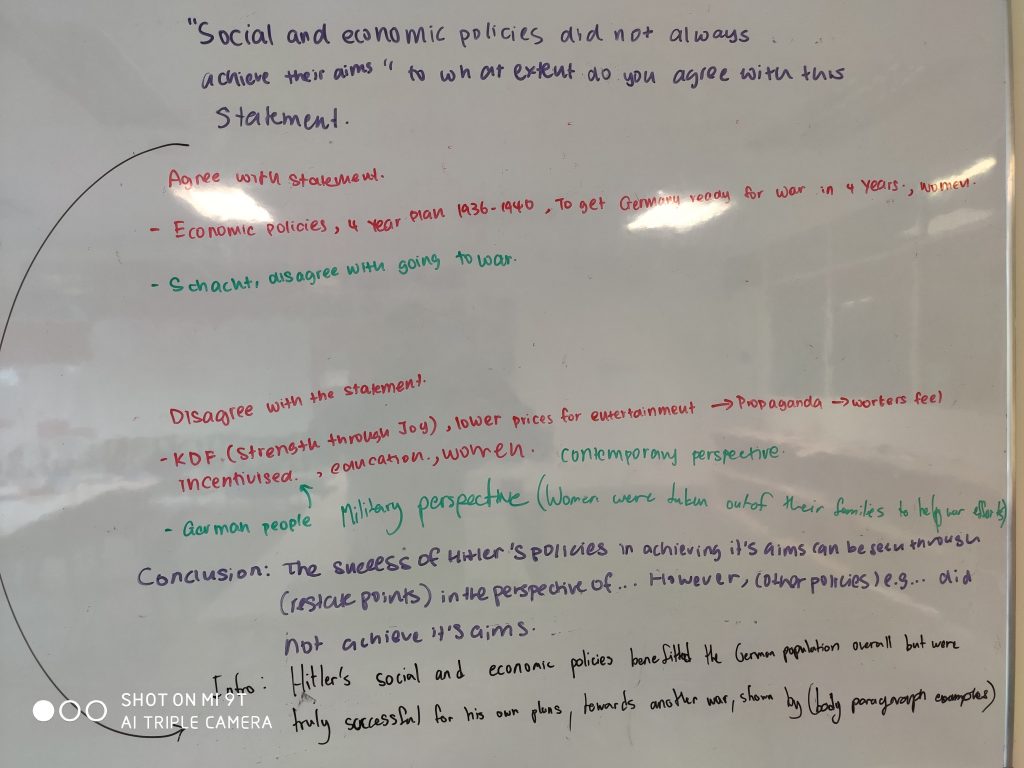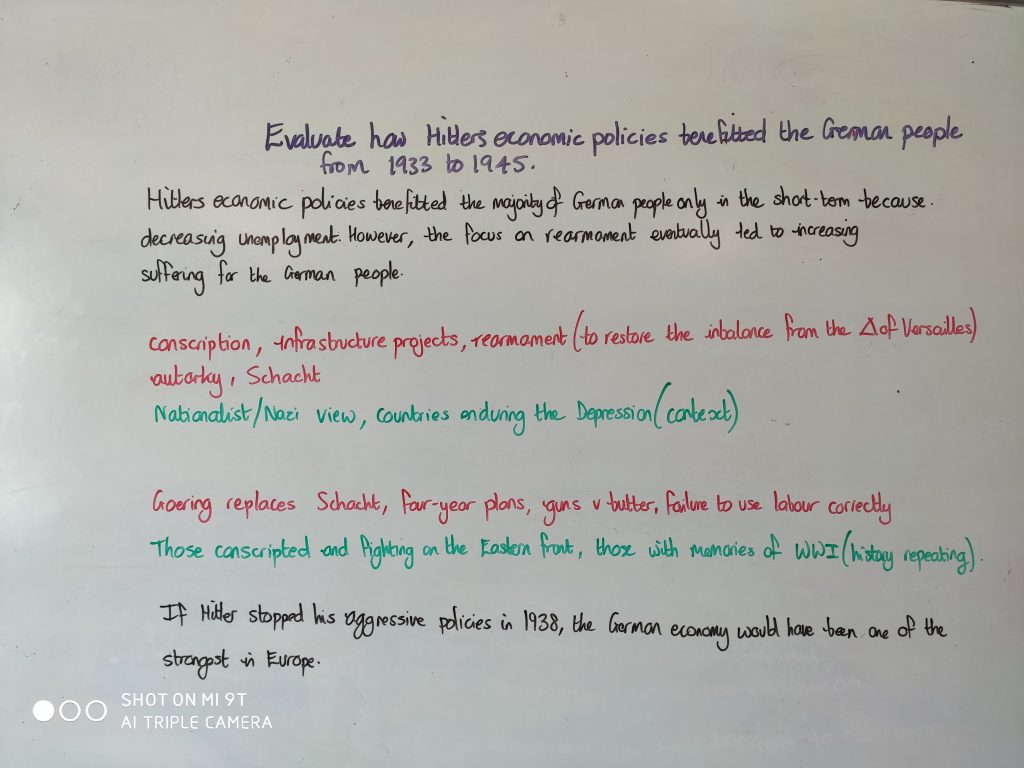November 2019
Compare and contrast the importance of the use of force on the emergence of two authoritarian states, each from a different region.
TS – Mao used force in terms of winning the civil war and introducing programmes such as the Rectification Movement in 1942. Hitler also used force, such as the role of the SA in disrupting communist (KPD) meetings. However, both leaders emerged to power from other more important factors, Mao because of foreign powers and Hitler because of the fear of communism.
Evaluate the impact of domestic economic policies on the maintenance of power in two authoritarian states, each from a different region.
May 2019
“Control of opposition was the most important method used to maintain power in authoritarian states.” Discuss with reference to two authoritarian states.
Compare and contrast the impact of the policies of two authoritarian states on women.
November 2018
Examine the impact of the foreign policy of two authoritarian states on the maintenance of power in those states.
“Social and economic policies in authoritarian states did not always achieve their aims.” Discuss with reference to one authoritarian state.
May 2018
Compare and contrast the importance of propaganda to the emergence of two authoritarian states.
To what extent was authoritarian control achieved in two 20th-century states?
November 2017
To what extent did economic factors contribute to the emergence of two authoritarian states, each from a different region?
“The maintenance of power was dependent on the successful control of opposition.” Discuss with reference to two authoritarian leaders.
May 2017
“The conditions in which authoritarian states emerged were mainly determined by economic factors.” Discuss with reference to two authoritarian states.
Compare and contrast the methods used to maintain power in two authoritarian states, each from a different region.
Previous Examination Questions
1. Was Hitler’s seizure of power inevitable on January 30th 1933?
TS – There was nothing inevitable about Hitler taking power in January 1933. Indeed, after the November 1932 election, the NSDAP was seen as a spent force.
NSDAP gains deteriorated as the economy began to show signs of recovery. Their support reached its peak in July 1932. The worst effects of the Depression were over and there were seeds of recovery.
Hitler did not seize power but was instead handed it. Henry Ashby Turner
Fritz Fischer (also useful to research for the causation of the First World War) believed that the German society was aristocratic and never fully subscribed to the foreign version of democracy.
BUT Treaty of Versailles, diktat, Weimar Republic, hyperinflation, foreign powers all seen as problems in Germany. The NSDAP, with its charismatic and authoritative leader, was a solution to them. Germany would eventually need a return to strong leadership to solve these problems.
The Nationalists would agree with the statement above. They would argue that his plan to return Germany to glory, highlighting the achievements of Frederick the Great and Bismarck, and explaining how Hitler was destined to do the same. However, it is possible that modern-day extreme nationalists agree with Hitler’s rise in 1933. He only failed because of the Communist and Jewish conspiracy to thwart him!
There is a further argument that Germans after the war may blame Hitler and the Nazis for seizing power. This would absolve them of the blame for all the atrocities of the regime.
However, after the war ended and the truth about the Nazi genocide became public, this nationalist view became taboo. Examine the role of the economy in the emergence of two authoritarian states, each chosen from a different region.
2. Examine the impact of war on the emergence of two authoritarian states, each chosen from a different region.
3. Analyse the methods used by one authoritarian state to establish power.

4. To what extent is charismatic leadership key to the successful establishment of power by authoritarian states?

5. Discuss the significance of the treatment of opposition in two authoritarian leaders’ maintenance of power, each chosen from a different region?
6. “The use of force is the most significant factor for an authoritarian leader’s consolidation of power.” To what extent do you agree with this statement?

7. Analyse the impact of foreign policy on the consolidation and maintenance of power of two authoritarian states each taken from a different region
8. Compare and contrast the treatment of minorities on two authoritarian states, each chosen from a different region.
9. Compare and contrast the treatment of opposition in two authoritarian states, each chosen from a different region.
10. Evaluate the impact of two authoritarian leaders on women and minorities, each chosen from a different region.
11. Compare and contrast the impact of political policies in two authoritarian states, each chosen from a different region.
12. Compare and contrast the impact of cultural policies in two authoritarian states, each chosen from a different region.
13. Examine the impact of the foreign policy of two authoritarian states on the maintenance of power in those states.
14. “The conditions in which authoritarian states emerged were mainly determined by economic factors.” Discuss with reference to two authoritarian states.
15. Compare and contrast the methods used to maintain power in two authoritarian states, each from a different region.
16. To what extent did economic factors contribute to the emergence of two authoritarian states, each from a different region?
TS – The First World War for Italy and Great Depression for Germany resulted in the middle classes of each country seeking alternative governments which would focus on restoring their country and ridding them of the socialist or communist threat.
The Weimar Republic had had a turbulent decade in the 1920s. Politically they had numerous governments and had to endure continual economic problems. Consequently, their reputation was further shot when the US loans which had stabilised the economy were withdrawn because of the Depression. Although Hitler became Chancellor in 1933, Germany was already on the way to authoritarian rule, Hindenburg using Article 48 sixty times in 1932 alone.
Politically, Germany wanted a more authoritarian government. It had grown and become successful under monarchs and powerful chancellors, Frederick the Great and Bismarck for example, so a return to this system would solve the political problems post-1918.
17. “The maintenance of power was dependent on the successful control of the opposition.” Discuss with reference to two authoritarian leaders.
18. Compare and contrast the importance of propaganda to the emergence of two authoritarian states.
19. “The domestic policies of authoritarian states rarely benefitted women.” Discuss with reference to two authoritarian states.
20. “Social and economic policies in authoritarian states did not always achieve their aims.” Discuss with reference to one authoritarian state.

21. “The use of force was the most important method used to maintain power in authoritarian states.” Discuss with reference to two authoritarian states.
22. Compare and contrast the impact of the policies of two authoritarian states on women.
23. Evaluate how Hitler’s economic policies benefitted the German people from 1933 to 1945.

Resources
